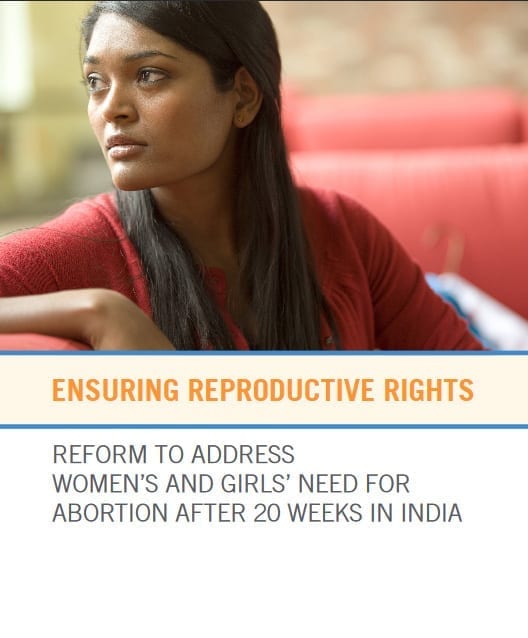Human Rights Council Adopts Groundbreaking Resolution on Maternal Mortality
For the third year running, the UN’s Human Rights Council has focused its attention on the global problem of preventable maternal mortality and morbidity. A ground-breaking resolution was adopted yesterday, in which States reaffirm their commitment to addressing the root causes of preventable maternal deaths and disability.Organizations like the Center for Reproductive Rights have been working tirelessly for the UN – through the Council and its human rights mechanisms – to pay serious attention to maternal mortality as a human rights issue. Every day, an estimated 1000 women die in pregnancy or childbirth, and each year over 10 million women suffer from infections, injuries or disabilities. The persistence of maternal deaths and disability from preventable causes – unsafe abortion, gender discrimination, and treatable complications during pregnancy – tarnishes the human rights record of many countries in the developed and developing world.
International commitments made through the Millennium Development Goals, the UN Secretary General’s Strategy on Women and Children’s Health and others, have put the spotlight on improving strategies to tackle women’s health. Yesterday, the Human Rights Council has once again delivered a clear message that without paying close attention to the key principles of a human rights approach – accountability, participation, transparency, empowerment, sustainability, international cooperation, and non-discrimination – attempts to reduce maternal mortality and morbidity will be insufficient and ineffective.
There are two reasons why today’s resolution is ground-breaking. Firstly, an unprecedented number of countries (over 90) co-sponsored the resolution, demonstrating that States’ commitment is consolidating and deepening. Secondly, the Council’s resolution takes a crucial first step beyond the theory of the human rights-based approach and towards its practical implementation.
In the United States, the human rights-based approach could support and encourage efforts to address disparities in access to and quality of healthcare for racial and ethnic minorities[1] through the implementation of provisions of the Patient Protection and Affordable Care Act of 2010 (healthcare reform). Such approaches might include the standardization of data collection among states to address gaps in service provision, and better understand the causes of poor health outcomes in different racial and ethnic groups.
The Kenyan National Commission on Human Rights recently launched an official inquiry into human rights abuses in the context of sexual and reproductive healthcare, holding public hearings and gathering women’s testimonies of their experiences seeking reproductive healthcare, with a view to improving the provision of these services.[2] The terms of reference of this inquiry resonate with many of the key principles of the human rights-based approach – tackling discrimination, promoting participation and demanding accountability – and show the feasibility of implementing this approach through existing institutions, with a view to making improvements in policy and the delivery of reproductive health services.
The Philippines imposes criminal penalties on abortion without any clear exceptions, which means that a woman is unable to terminate a pregnancy legally or safely even if it poses a serious risk to her life or health. These restrictions lead women to seek clandestine abortions, often in unsafe or dangerous conditions. In 2008, roughly 1000 women lost their lives due to unsafe abortions and as many as 90,000 were hospitalized for complications from unsafe abortions.[3] Applying a human rights-based approach in this context would require the Philippines government to decriminalize abortion on certain grounds because of its contribution to maternal mortality and morbidity.
Today’s resolution paves the way for an expert-led workshop to be convened by the Office of the High Commissioner for Human rights, tasked with drafting technical guidance for States on implementing the human rights-based approach in their policies and programs to reduce preventable maternal mortality and morbidity. The Center, alongside many NGOs around the world, had advocated for the Council to direct future work towards this practical approach, proposing the expert-led process of drafting technical guidance as an essential means to achieving effective, coordinated and coherent implementation of the human rights-based approach to eliminating preventable maternal mortality and morbidity.
Background
The Center has been a global leader in the effort to end maternal mortality. Since launching the International Initiative on Maternal Mortality and Human Rights with five other groups in 2007, the Center has worked nationally, regionally and internationally to put every woman’s basic human right to a safe and healthy pregnancy and childbirth on the forefront of States’ agendas. The Center has authored a number of reports documenting the human rights violations and barriers that women face when trying to access maternal health care services. The Center also recently celebrated the landmark decision from the UN Committee on the Elimination of Discrimination Against Women, in the case of Alyne da Silva v. Brazil, the first ever case in which a UN treaty body has identified a State’s responsibility for a series of human rights violations arising from the preventable death of a woman during pregnancy.
[1] For more information on the impact of healthcare reform on maternal health, see, e.g., Amnesty International, Deadly Delivery: The Maternal Health Care Crisis in the USA: One Year Update (2011), available at www.amnestyusa.org/sites/default/files/deadlydeliveryoneyear.pdf .
[2] See, Center for Reproductive Rights, Kenya Launches Groundbreaking Inquiry into Reproductive Rights Violations, //www.reproductiverights.org/en/press-room/kenya-launches-groundbreaking-inquiry-into-reproductive-rights-violations (last visited Sept. 28, 2011).
[3] Alan Guttmacher Institute, Meeting Women’s Contraceptive Needs in the Philippines, 1 In Brief 2 (2009). See, also, Center for Reproductive Rights, Forsaken Lives: The Harmful Impact of the Philippine Criminal Abortion Ban (2010), available at //www.reproductiverights.org/sites/default/files/documents/phil_report_Spreads.pdf .

